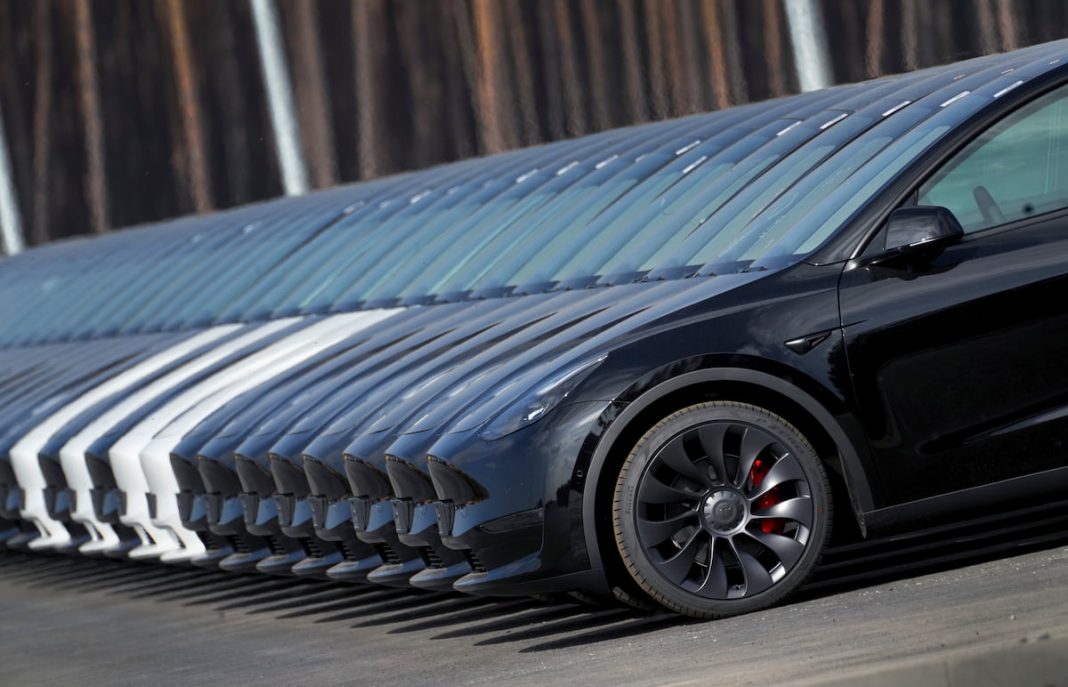Australia has missed a major electric vehicle milestone and the reason for it stinks.
Sales of low-emission vehicles had been tipped to top 100,000 for the first time in 2023 after their popularity more than doubled throughout the year.
But just as thousands of motorists were expecting a Christmas car delivery, the cargo ship holding them off the coast of Brisbane turned around and returned to China.
The reason? The discovery of yellow-spotted stink bugs.
Industry experts are calling the event an unexpected and frustrating speed bump for a market that is finally thriving in Australia.
But biosecurity experts say the pest discovery shows the nation’s quarantine system is working, and such high-profile cases could ultimately help protect all Australians from financial harm.
The car-carrying ship at the heart of the hold-up, the Glovis Caravel, arrived off Brisbane in late October and has capacity for 6500 vehicles.
Many of those it was carrying were reportedly Tesla Model Ys, though Kia has also confirmed about 1000 of its vehicles were aboard.
The Department of Agriculture, Fisheries and Forestry says authorities have been working with the vessel’s operators to manage risks after the discover of live insects.
“There were multiple detections, including yellow-spotted stink bug which poses significant threat to Australia’s plant health and environment because of the damage it can do to agricultural crops, fruit and ornamental trees,” according to a spokesperson.
“The vessel has left Australian territory on its own accord in order to manage the biosecurity risk associated with the goods.”
The ship has since returned to Shanghai, where the vehicles have been unloaded.
Customers expecting Tesla Model Ys in December reported receiving updates from the automaker explaining the delay and promising to investigate other options, including assigning them cars “from the next batch of production”.
The delay appears to have had significant impact on Tesla in Australia, with sales of its Model Y dropping from 3157 in November to 1351 in December, according to the Federal Chamber of Automotive Industries.
But Electric Vehicle Council chief executive Behyad Jafari says the delayed shipment impacted Australia’s entire market.
Motorists around the nation bought 87,217 electric cars in 2023, or more than double the figure from 2022, but fell just short of the council’s forecast.
“Deliveries of electric vehicles would have passed 100,000 if it wasn’t for this ship being turned around with stink bugs and that would be been nice for us to celebrate,” he says.
“Nobody sets out to have these problems come up.”
Australian Electric Vehicle Association national president Chris Jones says the issue was not entirely unexpected, however.
“New Zealand had trouble with these pests all last year and it was only a matter of time before Australia did too,” he says.
“Ships have been turned around for quarantine reasons before but it’s a shame that it happened to be when there was a stack of EVs on board that people had been waiting for.”
Biosecurity experts have been warning about potential invasions by “alien” stink bugs, particularly the high-risk brown marmorated stink bug, for some time.
The CSIRO has worked with the agriculture department to develop and test an app using artificial intelligence to detect high-risk stink bug species in real-time to aid biosecurity officers.
The organisation estimates invasive alien species in Australia already cost the nation about $25 billion each year in agricultural losses and pest management.
The bug detected in the cargo ship is common to Asia and could pose a risk to fruit crops if imported into Australia, including pears, peaches, apples and kiwifruit.
University of South Australia associate professor Patrick O’Connor says while delays in any imports can be frustrating, the detection will ultimately benefit the entire community.
“For something like turning around a ship or delaying access to EVs, there’s a private cost,” he says.
“But otherwise (the price) could be billions of dollars borne by many individuals over generations and have significant consequences that you can’t foresee.”
Species that did not evolve in Australia are likely to be disruptive, he says, and may have no natural predators.
He says detecting bugs at Australian ports and preventing them getting into the country is the “only sensible way to tackle the problem” but he warns Australia may need to further advertise its significant biosecurity penalties to underline the message and ensure this does not happen regularly.
“It’s not a good thing that a ship left another country with the bugs on board and our system hasn’t sent enough of a message not to do that,” Mr O’Connor says.
“This should send a message that we want you to take every precaution before you leave for Australia.”



